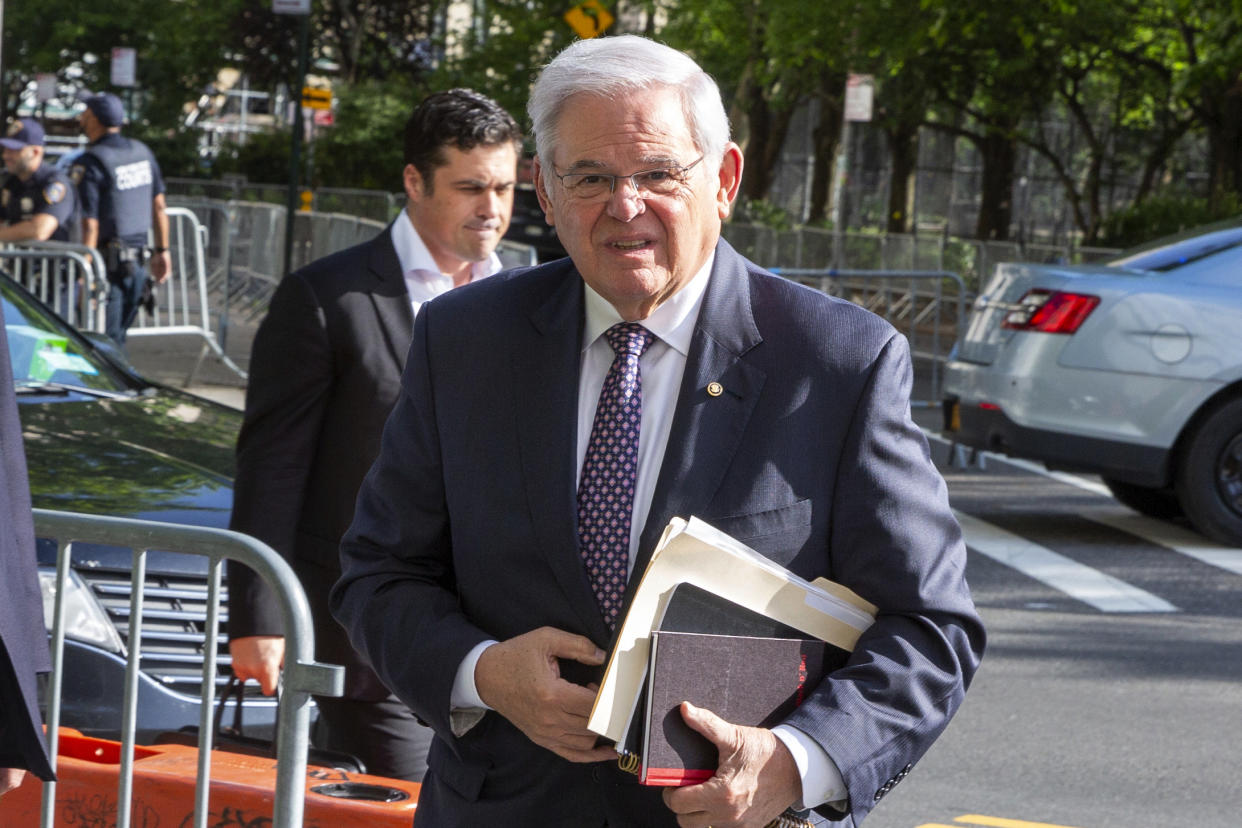Menendez told top USDA official to ‘stop interfering’ with company accused of offering bribes

NEW YORK — In May 2019, a senior official at the USDA was told by his then-chief-of-staff that Sen. Bob Menendez would call his personal cell phone in around an hour.
The agriculture official, Ted McKinney, had been trying to get Egyptian officials to reverse their decision to grant a new company a monopoly certifying halal meat exported to that country. That decision, he recalled from the witness stand of Menendez’s corruption trial Friday, was “very unusual” and could hurt American beef interests.
McKinney said that he would “never forget the words” Menendez told him during the brief call: “Stop interfering with my constituent.”
The call is a key account that prosecutors cited in their case against Menendez, who is accused of receiving bribes to benefit New Jersey businesspeople and the Egyptian government. Federal prosecutors allege that lucrative halal certification monopoly granted to IS EG Halal, a New Jersey company led by Wael “Will” Hana, helped supply funds used to bribe Menendez.
In spring 2019, Egyptian officials decided to decertify all halal meat certification companies in the country except for IS EG Halal. The decision came as a surprise to American agriculture officials, recalled McKinney, who now leads the National Association of State Departments of Agriculture.
McKinney said that America dominated beef liver exports to Egypt at the time; beef livers were a key profit stream for American beef companies. But if a single company had the halal certification monopoly, that could raise prices for Egyptian customers — thus dissuading purchases of American meat, he said.
Before McKinney received the call from Menendez, he reached out to the Egyptian ambassador in Washington, D.C., and his counterpart in the Egyptian government overseeing agricultural issues asking them to reconsider the new monopoly. Both times, he said, he received no response.
Then Menendez called.
McKinney said he recalled the senator being “serious” and “curt.” He felt that Menendez was trying to get him to “stand down” in pushing back against the certification monopoly. When McKinney tried to explain his concerns about the halal certification monopoly to Egypt, he recalled Menendez cutting him off.
“I was interrupted very early in my explanation,” he said. “I didn’t get very far.”
McKinney said that he thought back in 2019 that “something nefarious was going on” with the halal monopoly — remarks that defense attorneys for Menendez and Hana objected to in court. U.S. District Judge Sidney Stein told jurors to “disregard” those comments.
The team McKinney oversaw at the USDA declined to keep questioning the halal certification monopoly — or respond to Menendez’s call — after learning that the FBI was investigating, McKinney said.
Attorneys for Menendez during opening statements of the trial have described the call to McKinney as constituent services (another USDA official said that the monopoly drove another company with New Jersey ties was put out of business by the monopoly). And regardless of the nature of the call, Menendez’s attorneys have argued that the conduct is not illegal.
“He's allowed to advocate to a federal agency on behalf of a company that is a constituent,” Menendez attorney Avi Weitzman said during his opening statements. “And he's even allowed to yell at a federal employee. None of that is illegal. It's his constitutionally protected role.”
Adam Fee, another Menendez attorney who questioned McKinney on Friday, pointed out a discrepancy in some evidence shown to jurors: One letter from McKinney to his Egyptian counterpart objecting to the halal meat certification said that there were seven halal certifiers impacted by Egypt’s decision, while another USDA document said that four would be impacted.
Fee also pointed to a document circulated that claimed that halal certifiers were claiming that non-halal meat was indeed certified, although McKinney he would be “surprised if that were true.”
Hana, the owner of the halal meat company granted the monopoly, was described by his attorneys of having a close relationship with Nadine Menendez, the senator’s wife. She was initially charged in the wide-ranging bribery scheme, although she faces a separate trial as she faces health issues.
McKinney will continue to be questioned by defense attorneys on Monday.

